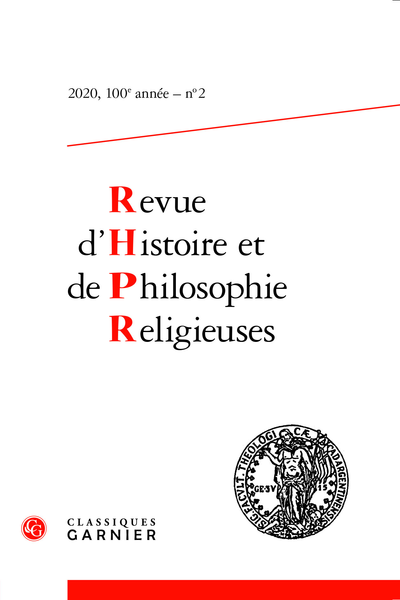
Résumés
- Type de publication : Article de revue
- Revue : Revue d’Histoire et de Philosophie Religieuses
2020 – 2, 100e année, n° 2. varia - Pages : 325 à 327
- Revue : Revue d'Histoire et de Philosophie religieuses
- Thème CLIL : 4046 -- RELIGION -- Christianisme -- Théologie
- EAN : 9782406106739
- ISBN : 978-2-406-10673-9
- ISSN : 2269-479X
- DOI : 10.15122/isbn.978-2-406-10673-9.p.0123
- Éditeur : Classiques Garnier
- Mise en ligne : 15/06/2020
- Périodicité : Trimestrielle
- Langue : Français
Résumés/Abstracts
Thomas Römer, « Sigmund Mowinckel et la question de l’aniconisme dans la religion yahwiste »
Cet article évalue l’importance de l’étude de S. Mowinckel, parue en 1929 dans la Revue d’Histoire et de Philosophie Religieuses, dans laquelle il émet des hypothèses sur les origines de l’aniconisme biblique. Ses études sur la forme bovine des représentations de Yhwh dont l’une se trouvait dans l’arche sont importantes mais doivent être modifiées à la lumière des recherches récentes qui ont montré que l’aniconisme ne naît qu’après la destruction de Jérusalem en 587 avant l’ère chrétienne.
Mots-clés : Mowinckel, aniconisme, arche, statues, stèles, représentations de Yhwh, Jéroboam, Josias, monothéisme.
Thomas Römer, “Sigmund Mowinckel and the Question of Aniconism in Yahwist Religion”
This paper evaluates the importance of Sigmund Mowinckel ’ s study, published in 1929 in the Revue d’Histoire et de Philosophie Religieuses, in which he hypothesizes about the origins of biblical aniconism. His studies on the bovine form of the representations of YHWH, one of which was found in the Ark, are important but need to be modified in light of recent research which has shown that aniconism only arose after the destruction of Jerusalem in 587 BCE.
Keywords: Mowinckel, aniconism, Ark, statues, stelas, representations of Yhwh, Jeroboam, Josiah, monotheism.
Gilbert Vincent, « Phénoménologie, herméneutique du langage religieux, éthique. Paul Ricœur et la RHPR »
Les textes de Paul Ricœur publiés dans la RHPR sont autant de moments marquants dans un parcours qui traverse des paysages philosophiques et des topiques variées, mais non disparates : phénoménologie et existentialisme, linguistique, anthropologie et éthique. Le fil conducteur de cette pensée est probablement une « poétique de l’espérance » apte à soutenir le vouloir, malgré fautes et passions.
326Mots-clés : faute, culpabilité, imagination, métaphore, parabole, don, philosophie de la religion, Bible, herméneutique.
Gilbert Vincent, “Phenomenology, Hermeneutics of Religious Language, Ethics. Paul Ricœur and the RHPR”
All of Paul Ricœur ’ s contributions in the RHPR are outstanding moments in a journey which crosses philosophical landscapes and varied, but not disparate, topics: phenomenology and existentialism, linguistics, anthropology and ethics. The guiding thread of this thought is probably a “poetics of hope” capable of sustaining the will, in spite of faults and passions.
Keywords: Ricœur, fault, guilt, imagination, metaphor, parable, gift, philosophy of religion, Bible, hermeneutics.
Christian Grappe, « La RHPR et la littérature intertestamentaire »
Depuis son origine, la RHPR a contribué, à sa manière, à montrer l’importance et l’intérêt de la littérature intertestamentaire entendue au sens large, à la fois en elle-même et pour éclairer d’autres littératures et, plus particulièrement, le Nouveau Testament. Dans cette riche histoire, Marc Philonenko fait office d’acteur majeur.
Mots-clés : Marc Philonenko, André Caquot, Antonin Causse, André Dupont-Sommer, comparatisme, manuscrits de Qoumrân, Nouveau Testament, Septante, Testaments des douze patriarches.
Christian Grappe, “The RHPR and Intertestamental Literature”
Since its inception, the RHPR has contributed, in its own way, to showing the importance and interest of intertestamentary literature understood in the broadest sense, both in itself and to enlighten other literatures and, more particularly, the New Testament. In this rich history, Marc Philonenko is a major contributor.
Keywords: Marc Philonenko, André Caquot, Antonin Causse, André Dupont-Sommer, comparatism, Qumran manuscripts, New Testament, Septuagint, Testaments of the Twelve Patriarchs.
Matthieu Arnold, « La RHPR, passerelle entre la théologie allemande et la théologie française »
Dès 1926, la RHPR a publié, le plus souvent en français, des articles d’auteurs allemands. Cette publication a été le fruit d’une politique 327volontariste de la RHPR, soucieuse d’être « un lien entre la théologie allemande et la théologie française » (O. Cullmann). À côté de ces articles, qui touchent surtout au Nouveau Testament et à l’histoire de la Réforme, la RHPR a publié dans toutes les disciplines théologiques des centaines de comptes rendus d’ouvrages allemands.
Mots-clés : Rudolf Bultmann, Antonin Causse, Oscar Cullmann, Karl Ludwig Schmidt, histoire du christianisme, exégèse du Nouveau Testament, théologie allemande, Heidelberg, Marbourg, Tübingen.
Matthieu Arnold, “The RHPR, a Bridge Between German and French Theology”
As early as 1926, the RHPR published, mostly in French, articles by German authors. This publication was the result of a voluntarist policy of the RHPR, anxious to be “a link between German and French theology” (O. Cullmann). In addition to these articles, which deal mainly with the New Testament and the history of the Reformation, the RHPR has published hundreds of reviews of German works in all theological disciplines.
Keywords: Rudolf Bultmann, Antonin Causse, Oscar Cullmann, Karl Ludwig Schmidt, history of Christianity, exegesis of the New Testament, German theology, Heidelberg, Marburg, Tübingen.
Alfred Marx, « “Marcher dans les chemins de vérité” (Tobit 1,3). Origine et histoire d’une locution »
Dans le livre de Tobit, Tobit se présente comme « marchant dans les chemins de vérité ». Cette expression est unique dans toute la littérature grecque antique. La présente étude se propose d’en déterminer l’origine et de suivre ses prolongements dans la littérature esséno-qoumrânienne.
Mots-clés : Tobit, vérité, essénisme, Qoumrân, mariage, influence iranienne.
Alfred Marx, “Walk in the Truth (Tobit 1:3). Origins and History of an Expression”
In the Book of Tobit, Tobit introduces himself as “walking in the paths of truth”. This expression is unique in the whole of ancient Greek literature. The present study aims to discover its origin and to follow its development in the Essene-Qumranic literature.
Keywords: Tobit, truth, Essenism, Qumran, marriage, Iranian influence.